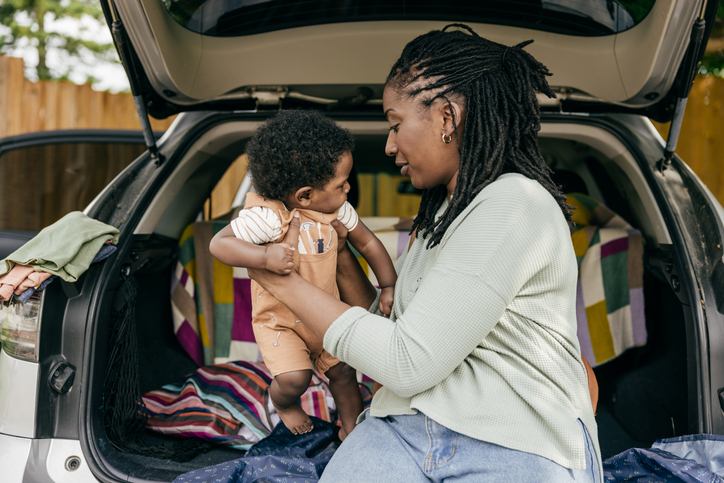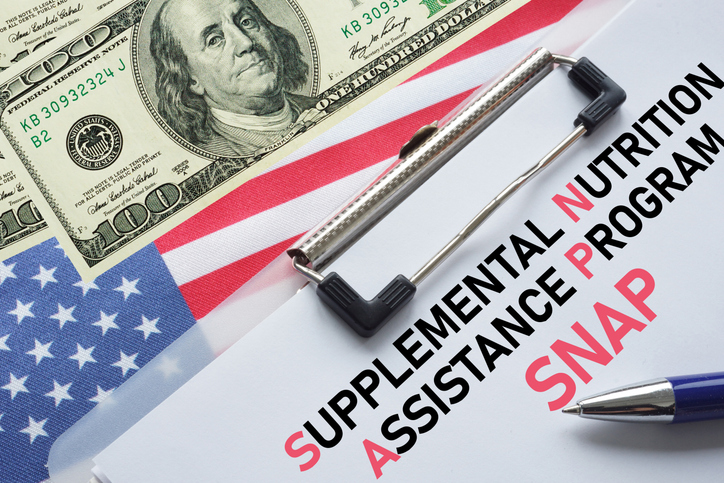How The ‘Big Beautiful Bill’ Harms Black Women

My daughter came into this world four months too soon.
For four months, we lived beneath the blinking lights and beeping machines of the neonatal intensive care unit at one of the best children’s hospitals in the United States. Every single day, I watched her chest rise and fall with fierce determination—a rhythm more sacred than any song I’d ever heard. And every single day as I was healing, body torn and spirit shaken, I kept watch. Wondering if she would survive the night.
My then-husband and I both worked full-time. We had what people call “good jobs.” We had private insurance. We had done things the so-called “right” way. And still, my daughter’s and my hospital bills climbed toward hundreds of thousands of dollars.
Medicaid saved us.
It stepped in where our private insurance fell short. It covered the care that helped my daughter live. It gave me space to recover from the complications of her birth. And because I qualified for Medicaid, I also qualified for WIC, which ensured there was food in the fridge and formula in the cabinet when I couldn’t nurse. Without those programs, I would still be in debt today, almost twenty years later. I might have lost our home. I honestly don’t know how I would’ve made it back to myself.
Public assistance didn’t just help us survive; it helped us recover and thrive. It gave us a second chance to live with dignity.
So when I hear politicians talk about “lazy welfare moms” or “irresponsible spending,” I think of mothers like me. I think of babies like mine. And I know they’re flat out lying.
The “Big Beautiful Bill,” passed July 3, 2025, is everything but beautiful. It is treacherous. It slices through Medicaid and shreds the very supports that keep families like mine afloat. It does this all while handing over $1.5 trillion in tax cuts to billionaires and corporations.

For Black women, especially, this bill is not just bad policy; it’s a blueprint for abandonment and deep harm. The bill includes the largest Medicaid cuts in U.S. history. That’s not just numbers on a page; that’s a death sentence for some of us.
More than 65% of Black births are covered by Medicaid. And still, Black women are three times more likely to die from pregnancy-related causes than white women. When a mother hemorrhages and dies because she couldn’t afford prenatal care, the state will call it a tragedy. When a baby is born too early because her mother had to choose between groceries and gas to get to the clinic, it will be called unfortunate. But we know better.
None of what is coming will be mere misfortune. It will be the result of intentional policy. It will be neglect baked into law.
The Big Beautiful Bill also targets Planned Parenthood, stripping Medicaid funding from clinics that offer abortion services, even when the money is used for preventive care. The bill doesn’t just go after abortion—it threatens access to cancer screenings, STI testing, prenatal visits, and birth control, especially for low-income patients who rely on these clinics as their only source of care.
Over 2.4 million people, many of them Black and Brown women, rely heavily on these facilities for reproductive care. And when those clinics close, Black women will be hit hardest. We already die from cervical cancer at rates 65% higher than white women. Denying access to reproductive care isn’t just cruel; for Black women, it is a calculated decision — a quiet, systemic verdict on who is allowed to heal and who is left to die.
Another way this atrocious bill harms Black women is in how it expands work requirements for SNAP, demanding that recipients log 80 hours per month of work, volunteering, or training, even as costs rise and wages stagnate. But let’s be clear: Black women are already among the most active labor groups in this country. Many of us are working multiple jobs while caring for elders and children. We’re doing the most with the least, and still, we are asked to prove our worth, over and over again.
We know this bill isn’t about encouraging work. It’s about punishing poverty. It’s about turning hunger into a test and bureaucracy into a weapon. And we also know who will be hurt most. Nearly 1 in 4 Black children rely on SNAP to eat.
Those hungry children will learn early that the leaders of this country see their needs as a burden. Hungry mothers will skip meals so their children don’t have to. And too many hardworking families will internalize their struggles, believing their hunger is a personal failure, rather than the result of a government that has turned its back on their most basic needs. SNAP doesn’t just fill plates. It protects dignity. And when you take it away, you don’t just cause hunger—you cause harm that can echo for generations.

Housing vouchers and child care subsidies are also deeply slashed by the “Big Beautiful Bill,” stripping away supports that Black women rely on to stay housed and hold down jobs. Without these critical programs, more of us will be pushed into homelessness, and more of our children will be left without care—a reality underscored by reporting that the proposal would cut roughly 43% of federal housing assistance, affecting up to 3.8 million people.
When these foundations crumble, families aren’t just stressed; they’re left vulnerable to displacement and systemic breakdown. And when housing becomes unstable or a parent misses a medical appointment because she can’t get off work, the government doesn’t send help. It sends Child Protective Services to surveil and separate families.
Poverty becomes neglect, parents become suspects, and children become case numbers. This bill will cause more family separations, not because Black mothers are unfit, but because we are under-resourced.
As the Child Welfare Information Gateway explains, poverty-related hardships like housing instability and lack of childcare often lead to child welfare involvement, even when no harm has occurred. We must think deeply about how many more Black families will be torn apart by the child welfare system, given that 53% of Black children will face a CPS investigation before the age of eighteen—a stark reflection of how racism and racial capitalism, not parental unfitness, too often drive the surveillance and separation of our communities.
But here’s what they don’t count on: Us.
Black women have always turned scarcity into sanctuary. We’ve always built networks of care from the crumbs we were handed. Through mutual aid, we feed each other, house each other, and heal each other. We show up when systems don’t—because no one knows better than Black women that we can’t rely on systems to save us. These efforts are not, and have never been, just acts of kindness. They are acts of resistance, of strategy, and of survival.
It’s also important to note, though, that Black women deserve more than survival. We deserve joy, rest, community, and safety. Not divestment, surveillance, and punishment. And until this country learns how to give us those things, we’ll continue building them with our own hands, in our own names, for our own people.
The “Big Beautiful Bill” is not beautiful—it is brutal. A love letter to the wealthy, and a warning to the rest of us. But we are not warnings. And as the great poet and thinker Audre Lorde reminds us: we are not only casualties—we are also warriors. We are mothers, sisters, healers, and builders. We are the ones who make this country possible, even as it tries to erase us. So we can’t be silent in this moment. We must organize, protest, protect, and pour into each other. Because solidarity will carry us forward.
And we will carry each other. Again and again.
Josie Pickens is an educator, writer, cultural critic, and abolitionist strategist and organizer. She is the director of upEND Movement, a national movement dedicated to abolishing the family policing system.
SEE ALSO:








